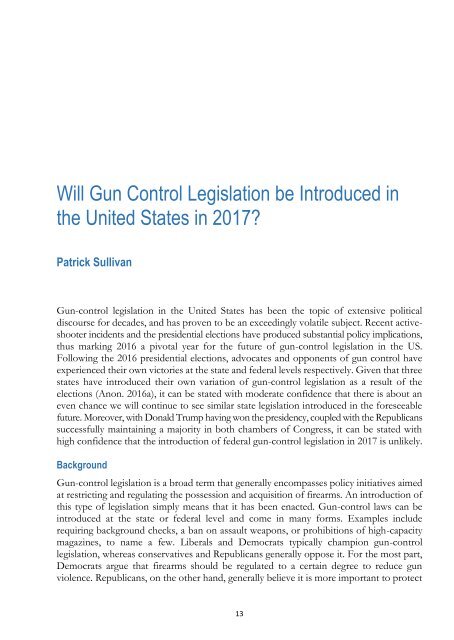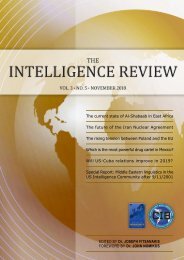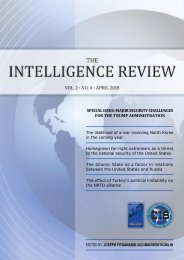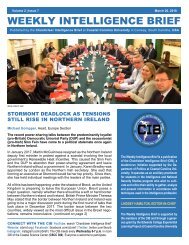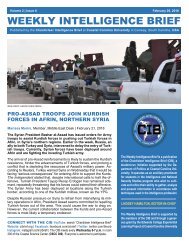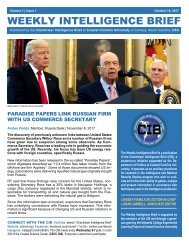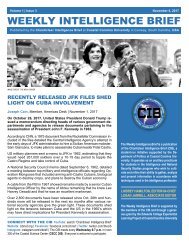The Intelligence Review | volume 1 | issue 2 |
This volume is the product of a collaboration between the European Intelligence Academy (EIA) and the Chanticleer Intelligence Brief (CIB), a student-run initiative supported by the Department of Politics at Coastal Carolina University in Conway, South Carolina, United States. Eleven CIB analysts tackle some of the most pressing and timely questions confronting intelligence observers today. Topics include the gun control debate in the United States, Russia’s involvement in the Syrian Civil War, the future of Kurdish nationalism, and the internal Palestinian dispute between Hamas and Fatah. Papers in this volume also examine the current state of Islamist extremism, and extrapolate on its future prospects in the Middle East, West Africa, the Lake Chad region, as well as in Southeast and Central Asia. CIB analysts propose carefully crafted and informed forecasts that outline future developments in some of the world's most unpredictable hot spots.
This volume is the product of a collaboration between the European Intelligence Academy (EIA) and the Chanticleer Intelligence Brief (CIB), a student-run initiative supported by the Department of Politics at Coastal Carolina University in Conway, South Carolina, United States. Eleven CIB analysts tackle some of the most pressing and timely questions confronting intelligence observers today. Topics include the gun control debate in the United States, Russia’s involvement in the Syrian Civil War, the future of Kurdish nationalism, and the internal Palestinian dispute between Hamas and Fatah. Papers in this volume also examine the current state of Islamist extremism, and extrapolate on its future prospects in the Middle East, West Africa, the Lake Chad region, as well as in Southeast and Central Asia. CIB analysts propose carefully crafted and informed forecasts that outline future developments in some of the world's most unpredictable hot spots.
- No tags were found...
Create successful ePaper yourself
Turn your PDF publications into a flip-book with our unique Google optimized e-Paper software.
Will Gun Control Legislation be Introduced in<br />
the United States in 2017?<br />
Patrick Sullivan<br />
Gun-control legislation in the United States has been the topic of extensive political<br />
discourse for decades, and has proven to be an exceedingly volatile subject. Recent activeshooter<br />
incidents and the presidential elections have produced substantial policy implications,<br />
thus marking 2016 a pivotal year for the future of gun-control legislation in the US.<br />
Following the 2016 presidential elections, advocates and opponents of gun control have<br />
experienced their own victories at the state and federal levels respectively. Given that three<br />
states have introduced their own variation of gun-control legislation as a result of the<br />
elections (Anon. 2016a), it can be stated with moderate confidence that there is about an<br />
even chance we will continue to see similar state legislation introduced in the foreseeable<br />
future. Moreover, with Donald Trump having won the presidency, coupled with the Republicans<br />
successfully maintaining a majority in both chambers of Congress, it can be stated with<br />
high confidence that the introduction of federal gun-control legislation in 2017 is unlikely.<br />
Background<br />
Gun-control legislation is a broad term that generally encompasses policy initiatives aimed<br />
at restricting and regulating the possession and acquisition of firearms. An introduction of<br />
this type of legislation simply means that it has been enacted. Gun-control laws can be<br />
introduced at the state or federal level and come in many forms. Examples include<br />
requiring background checks, a ban on assault weapons, or prohibitions of high-capacity<br />
magazines, to name a few. Liberals and Democrats typically champion gun-control<br />
legislation, whereas conservatives and Republicans generally oppose it. For the most part,<br />
Democrats argue that firearms should be regulated to a certain degree to reduce gun<br />
violence. Republicans, on the other hand, generally believe it is more important to protect<br />
13


